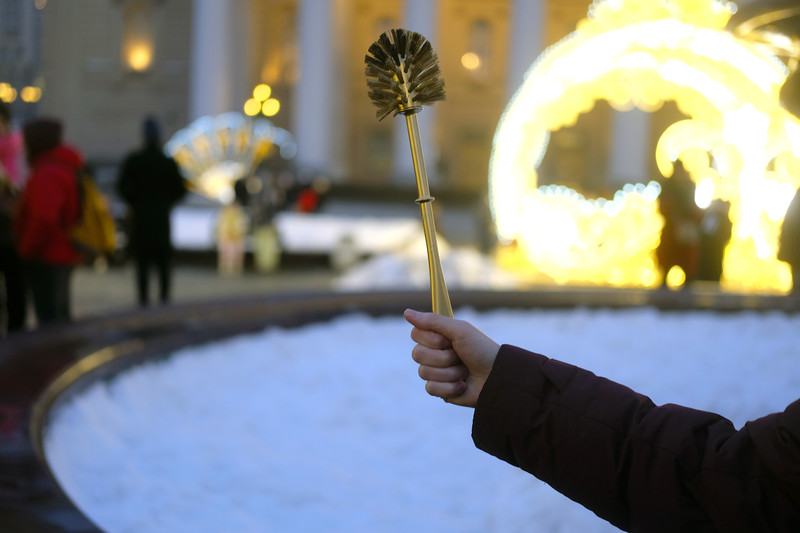EU & the World
Exclusive: Details Of The First-Ever EU Sanctions Against Corruption

Details of the proposals state that new EU sanctions against foreign kleptocrats must take into account the amount of bribes paid and should be decided by majority instead of unanimity.
The measures are part a wider effort to crackdown on corruption, including a newly announced ethics body to supervise EU institutions.
-

Photo: Michal Siergiejevicz. A Russian dissident with a disability, Vladimir Kara-Murza, was sentenced to 25-years in prison amid talks about potential EU sanctions.
According to a draft regulation seen by EUobserver on 4 May, the proposed new sanctions would impose asset freezes and visa bans for people deemed guilty “of serious acts of corruption around the world”.
They would cover “acts bribery” or “acts embezzlement” that “seriously affected… the objectives” of the [EU’s] “Common foreign and security policy”
The sanctions will take into consideration “the value of bribes or assets embezzled or misappropriated”, as well as the “importance of the public function(s) held by the official or other persons” when deciding on who to strike.
It would also look at whether “such acts were committed in a systematic way or through complex schemes”.
The move is aimed at corrupt foreign regimes – especially those that squander EU development aid – but it would not exempt EU citizens, given that thousands of Russians and Middle Easterners have acquired EU passports over the past few years.
The proposal stated that while the assets of those on the blacklist would be frozen, regardless of the passport they may hold, the sanctions will not “oblige a member state” to refuse entry to its own citizens.
EU sanctions are normally imposed through unanimous decisions by all 27 capitals. This leaves room for national vetoes.
The EU Commission has added a new twist to the anti-corruption measures by saying that the sanctions should be decided on a majority vote.
“The [EU] The commission proposed that the Council, acting with qualified majority on a proposal by a member state, or the high representative for foreign affairs and policy of the union,… establish and amend the “list” of targeted individuals or entities.
Legal experts from EU states are currently studying the new measures, before initial discussions in council working groups begin in the coming week.
One EU source commented, “We’ll have to see what the member states think of that”. She was referring to the audacity and absurdity of the idea.
“It’s still necessary to discuss it to see if member states are willing to move forward,” said an EU diplomat.
“Some member countries are afraid of the public perception. They think: “Who are we to act like a global police force when we have serious corruption issues in some of our countries?” “,” they added.
The EU has already implemented three similar sanctions regimes – on those guilty of human rights abuses, chemical weapons abuses and cyber attacks.
These sanctions are intended to hold bad actors accountable who enjoy immunity within their own jurisdictions. They also snap into action more quickly than the traditional EU sanctions which target rogue states instead of individuals.
The Dutch were the first to push for the EU’s “global human right sanctions regime”, also known informally in Brussels as the European Magnitsky Act. This was because it was inspired Sergei Magnitsky, the Russian dissident, who died in prison 15 years ago.
The EU Magnitsky Act covers crimes like genocide, slavery and “inhumane or degrading punishment or treatment”.
The fact that it did not cover corruption in the same way as the Magnitsky Act, which is the US equivalent, was always seen by campaigners as a weakness.
Bill Browder is a British hedge fund manager and human rights activist who was Magnitsky’s former employer.
He said that kleptocracy, state theft and a lack of accountability are the main causes of human rights abuses.
“This [the new EU proposal] It is a critical step,” he said.
If the EU decides to add the anti-corruption regulations to its arsenal, it will be interesting to see if they have the courage to use their new tools to go after the big fish.
Names so far
The European Global Human Rights Sanctions Regime, adopted three years ago, currently covers 35 individuals as well as 15 entities.
Four Russians are included in the list of those linked to the imprisonment of Alexei Navalny, an anti-corruption activist.
It covers 17 Russians connected to the Wagner mercenary band, the Ukraine War, and domestic repression.
“Ivan Ryabov, a policeman of the Moscow Police Station,” said the EU, when adding him to its list in March.
He arbitrarily detained female anti-war demonstrators in March 2022. The report said that the victims reported that he suffocated and physically abused them for six hours with plastic bags.
The list also includes four Chinese officials who were accused of persecuting Uighur minorities, a move which angered China in the past.
It does not name the Russians who are deemed responsible for orchestrating Magnitsky’s death despite the history and the sanctions.
It remains to be determined if the EU will name any of 28 Russians who were deemed responsible for sending Vladimir Kara-Murza a disabled Russian political dissident to a penal settlement for 25 years in the last month. This is after the first talks between EU ambassadors on the Kara-Murza issue on Thursday (11th May) in Brussels.
“If [the new EU anti-corruption sanctions] If they’re anything similar to the weak implementation of Magnitsky Act in the EU, it will take a lot more political pressure to get it to work,” Browder said.
EU & the World
Nicole Kidman ‘Didn’t Feel Exploited’ Filming Erotic Scenes in ‘Babygirl’ Movie

The actress previously told ‘Vanity Fair’ that she felt ‘very exposed’ while working on ‘Babygirl.’
EU & the World
Adam Brody to Star as Hot Rabbi in Netflix Film ‘Nobody Wants This’

Adam Brody will play a hot rabbi in Netflix’s ‘Nobody Want This’ starring alongside his on-screen love interest Kristen Bell.
EU & the World
JD Vance Mocks Kamala Harris’ CNN Interview

Donald Trump’s running mate compared the vice president’s CNN interview to former Miss South Carolina Caitlin Upton’s 2007 speech.
-

 Sports7 days ago
Sports7 days agoOfficial: Juventus announces sixth purchase
-

 Health & Society7 days ago
Health & Society7 days agoThe intoxicated society
-

 Politics5 days ago
Politics5 days agoThe Russian patriarch to Putin: You are the first truly Orthodox president
-

 Sports6 days ago
Sports6 days agoBeautiful Juve: Vlahovic and youth rout Verona. Thiago Motta first
-

 Sports6 days ago
Sports6 days agoJuventus, Vlahovic: “Now we play a different game.”
-

 Politics4 days ago
Politics4 days agoEU Intensifies Pressure: Six-Month Extension of Russia Sanctions
-

 Health & Society3 days ago
Health & Society3 days ago7 Superfoods That Will Boost Your Fitness Results
-

 EU & the World5 days ago
EU & the World5 days agoBrittany Cartwright Files for Divorce From Jax Taylor After 5 Years of Marriage









